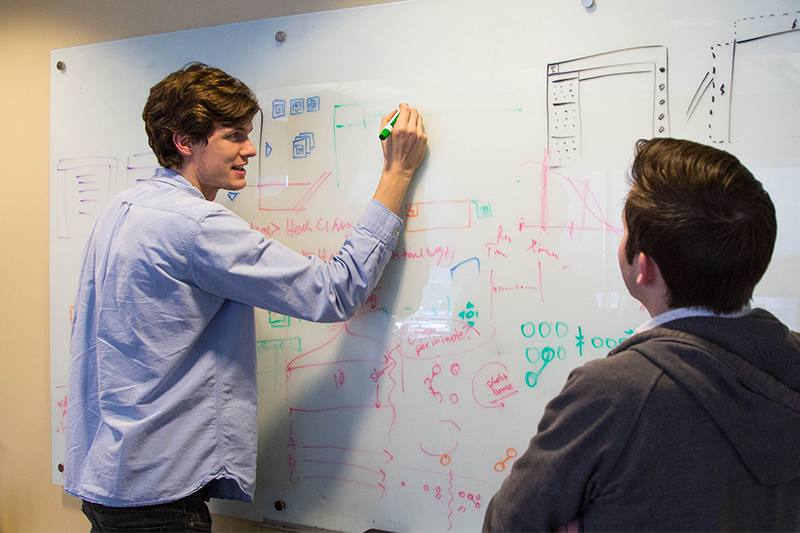1. Ask people to do hard things
 I’ve found people are usually capable of a lot more than they think. The majority of time, people simply need to be asked in order to stretch and achieve their potential. Issuing specific challenges tailored to each person on my team has helped them focus and realize more of their potential.
Recently, I challenged a team member to prepare to become a mentor for a new position we’re currently hiring for (aside: we still haven’t found the right person, which means you should definitely check it out!). I’ve seen this individual change his approach to coding. He now actively looks for questions to answer and is more willing to speak up because he knows he is going to be a mentor soon. I follow up regularly and remind him of the challenge and offer suggestions when appropriate. This keeps him focused on the challenge and makes it clear I believe in his abilities.
I’ve found people are usually capable of a lot more than they think. The majority of time, people simply need to be asked in order to stretch and achieve their potential. Issuing specific challenges tailored to each person on my team has helped them focus and realize more of their potential.
Recently, I challenged a team member to prepare to become a mentor for a new position we’re currently hiring for (aside: we still haven’t found the right person, which means you should definitely check it out!). I’ve seen this individual change his approach to coding. He now actively looks for questions to answer and is more willing to speak up because he knows he is going to be a mentor soon. I follow up regularly and remind him of the challenge and offer suggestions when appropriate. This keeps him focused on the challenge and makes it clear I believe in his abilities.
2. Know each team member
 Each person on the team has unique strengths and talents. Getting to know them personally helps me understand what they both enjoy and don’t like about their job. It gives me insight into what challenges will resonate with each individual, allowing them greater potential for success. Knowing the natural strengths of team members means I can leverage those strengths for the benefit of the entire team.
Establishing quality working relationships takes time and consistency. I hold weekly one-on-one meetings. I give each person time to talk about how things are going. I always prepare a few questions in advance to encourage feedback. My favorite question is “What was your favorite and least favorite part of work this week?” Asking this question helps me understand each employee’s strengths and weaknesses and reveals any underlying issues that team members may not be comfortable bringing up otherwise. This is a great starting point.
At Lucid, each team plans monthly activities outside of work settings, so they can get to know one another better. Some of the activities my team has done are escape rooms, glass blowing and bubble soccer. Even simply going out and getting lunch together provides for bonding opportunities. It gives me a chance to learn what people really care about and who they are in a non-work setting.
I’ve also found taking a lunch break to sit down with others is beneficial. Walking away from work for even 30 minutes makes my afternoon more productive. When I sit down with a team member during lunch, a good conversation inevitably follows. People might often feel more comfortable bringing up concerns in this type of casual setting rather than in more formal meetings.
Each person on the team has unique strengths and talents. Getting to know them personally helps me understand what they both enjoy and don’t like about their job. It gives me insight into what challenges will resonate with each individual, allowing them greater potential for success. Knowing the natural strengths of team members means I can leverage those strengths for the benefit of the entire team.
Establishing quality working relationships takes time and consistency. I hold weekly one-on-one meetings. I give each person time to talk about how things are going. I always prepare a few questions in advance to encourage feedback. My favorite question is “What was your favorite and least favorite part of work this week?” Asking this question helps me understand each employee’s strengths and weaknesses and reveals any underlying issues that team members may not be comfortable bringing up otherwise. This is a great starting point.
At Lucid, each team plans monthly activities outside of work settings, so they can get to know one another better. Some of the activities my team has done are escape rooms, glass blowing and bubble soccer. Even simply going out and getting lunch together provides for bonding opportunities. It gives me a chance to learn what people really care about and who they are in a non-work setting.
I’ve also found taking a lunch break to sit down with others is beneficial. Walking away from work for even 30 minutes makes my afternoon more productive. When I sit down with a team member during lunch, a good conversation inevitably follows. People might often feel more comfortable bringing up concerns in this type of casual setting rather than in more formal meetings.
3. Protect the team’s time
Distractions and issues come up often and if left unchecked, can interfere with a team’s success. As a manager, my team is most successful when I can filter other employees’ requests. Whether it’s a sales team member needing to have a certain feature added to finalize a deal or an urgent production issue affecting users, side projects always come up. Team members could easily get off-course from more important, long-term projects given the potential number of in-the-moment distractions. When I act as a filter for these types of last-minute issues, my team stays focused on the most important projects. The scrum methodology we follow at Lucid naturally helps with this, as the team is committed to completing the work during a sprint. Knowing that the work should be done at the end of the sprint helps everyone avoid getting sucked into less important issues that might arise. Often, if some non-urgent issue comes up, I add it to the backlog to take care of during the next sprint. Other employees are satisfied their requests will get done, and the team can continue focusing without interruption. I also try to be vigilant when things come up on Slack or when someone walks into our workspace. I pay attention and try to be the first one to respond so the whole team doesn’t get sidetracked into the problem or question. This means spending more of my time dealing with non-sprint issues, but it allows the rest of the team to stay focused.4. Foster a culture of trying
 Failure is part of every learning process. Mistakes will always be made. Protecting the team from distractions shouldn’t extend to protecting them from beneficial--and sometimes uncomfortable--learning opportunities.
It’s important to take time to learn and improve, so you can avoid past mistakes. Setting aside time for regular retrospectives is a great way of learning the most from failures. We make time at the end of every two-week sprint to review what we did well and where we might have fallen short. Feeling comfortable acknowledging and learning from mistakes allows team members to take risks and uncover big rewards.
As part of the retrospective, I feature a special section I like to call “Andy’s screw up of the sprint.” It’s a portion of the retrospective dedicated to mistakes that I personally made. I usually take a few minutes to talk through what I messed up and what I learned from it. Sharing the failure sets a tone of non-judgement for the session and shows the appropriate model of not shying away from admitting failure for the sake of learning.
Failure is part of every learning process. Mistakes will always be made. Protecting the team from distractions shouldn’t extend to protecting them from beneficial--and sometimes uncomfortable--learning opportunities.
It’s important to take time to learn and improve, so you can avoid past mistakes. Setting aside time for regular retrospectives is a great way of learning the most from failures. We make time at the end of every two-week sprint to review what we did well and where we might have fallen short. Feeling comfortable acknowledging and learning from mistakes allows team members to take risks and uncover big rewards.
As part of the retrospective, I feature a special section I like to call “Andy’s screw up of the sprint.” It’s a portion of the retrospective dedicated to mistakes that I personally made. I usually take a few minutes to talk through what I messed up and what I learned from it. Sharing the failure sets a tone of non-judgement for the session and shows the appropriate model of not shying away from admitting failure for the sake of learning.
5. Let the team be the heroes
As a team leader, it’s natural to want to swoop in and save the day every time things go wrong. Taking a step back instead of diving in is not the initial reaction I always have. It’s important to let people have opportunities to take the lead on certain challenges, so they can also be given credit when things go right. Our team recently built InDesign Import for Lucidpress. I was interested in the problem, but I turned a lot of it over to Thayne, a member of the Lucidpress team. I gave him the challenge to lead out and stepped out of the way. He did an amazing job building out the implementation. It wasn’t natural for me to want to step away, but I did and it paid off. Thayne grew, did a fantastic job and ended up writing a new open source project based on some of the work we did.6. Don’t be so serious
 There are times when things get difficult and people are anxious and stressed. These are the perfect times to not be too serious. Crack a joke (even if it’s a bad one), share a funny YouTube video, or the perfect xkcd.
There are times when things get difficult and people are anxious and stressed. These are the perfect times to not be too serious. Crack a joke (even if it’s a bad one), share a funny YouTube video, or the perfect xkcd.
Unrelenting stress can impede success. Maintaining a sense of humor keeps things in perspective and prevents people from defeating themselves. There are times to be serious, but those are pretty rare. Generally, a healthy amount of fun can make everyone more productive. When tensions were high trying to get our InDesign Import beta out on time, I would share something lighter during our daily standup. It’s good to take a break and relax for a couple of minutes as a team. I also keep a few Nerf guns at my desk to help with lightening the mood. They’re also great for getting people’s attention when their headphones are on (though, I wouldn’t recommend doing it too often).
7. Be prompt with difficult conversations
 This is a lesson I definitely learned the hard way. I worked with a team member that seemed to goof off a lot. I trust people to do their jobs, and they generally don’t let me down. This was the first time I had someone who just didn’t seem to care about getting the work done. Instead of quickly having a discussion, I waited and hoped it would get better (which, of course, it didn’t). By the time I eventually addressed the issue it was too late to make much of a change since the team member was an intern. I could have made a bigger difference to that individual and to the rest of the team’s morale had I spoken up sooner.
When an issue comes up or I see a need for feedback, I am now quick to pull the individual aside and let them know. It can be awkward, but it’s much less awkward than firing someone.
This is a lesson I definitely learned the hard way. I worked with a team member that seemed to goof off a lot. I trust people to do their jobs, and they generally don’t let me down. This was the first time I had someone who just didn’t seem to care about getting the work done. Instead of quickly having a discussion, I waited and hoped it would get better (which, of course, it didn’t). By the time I eventually addressed the issue it was too late to make much of a change since the team member was an intern. I could have made a bigger difference to that individual and to the rest of the team’s morale had I spoken up sooner.
When an issue comes up or I see a need for feedback, I am now quick to pull the individual aside and let them know. It can be awkward, but it’s much less awkward than firing someone.
Bonus: care about each individual
The most important part of leadership is actually caring about each person on the team. It’s not something that can be faked. When I focus on helping my team succeed because I genuinely care, my team gives me their best. We become a team that can accomplish anything. Feedback is easier to give because they know I have their best interest in mind. Team members are also more willing to overlook my leadership mistakes because they know I care. I’m still learning how to be a great leader. Hopefully, I have many years of management experience ahead of me, where I’m sure I’ll make more mistakes but hopefully, learn important leadership lessons from them. I’d love to hear your tips and advice on leading a team, technical or otherwise!About Lucid
Lucid Software is the leader in visual collaboration and work acceleration, helping teams see and build the future by turning ideas into reality. Its products include the Lucid Visual Collaboration Suite (Lucidchart and Lucidspark) and airfocus. The Lucid Visual Collaboration Suite, combined with powerful accelerators for business agility, cloud, and process transformation, empowers organizations to streamline work, foster alignment, and drive business transformation at scale. airfocus, an AI-powered product management and roadmapping platform, extends these capabilities by helping teams prioritize work, define product strategy, and align execution with business goals. The most used work acceleration platform by the Fortune 500, Lucid's solutions are trusted by more than 100 million users across enterprises worldwide, including Google, GE, and NBC Universal. Lucid partners with leaders such as Google, Atlassian, and Microsoft, and has received numerous awards for its products, growth, and workplace culture.

